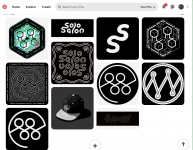sus
Moderator
I was reading Blackbird Spyplane this morning which is basically a consumerism column for New York neohipsters. They have a feature called V.I.P. R.A.D.A.R.,” ie. "Vibey Illustrious People with Rare And Dope Ass Recon." Basically they interview scenesters and ask for clothing/scent/furniture recommendations.
I've also heard Pinterest is coming back in a big way. See a lot more ads, user numbers are up. All about moodboarding a collage of aesthetic signifiers and cultural objects that constellate you.
What is your brand how do you cultivate it (do you cultivate it?) Are you a guy who only drinks Scotch are you a guy who collects Japanese vinyl what is your aesthetic-ideological niche in the cultural matrix and how do you feel about it?
I've also heard Pinterest is coming back in a big way. See a lot more ads, user numbers are up. All about moodboarding a collage of aesthetic signifiers and cultural objects that constellate you.
What is your brand how do you cultivate it (do you cultivate it?) Are you a guy who only drinks Scotch are you a guy who collects Japanese vinyl what is your aesthetic-ideological niche in the cultural matrix and how do you feel about it?



